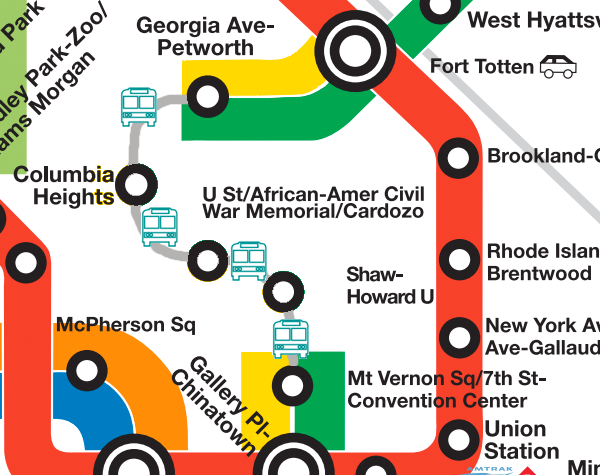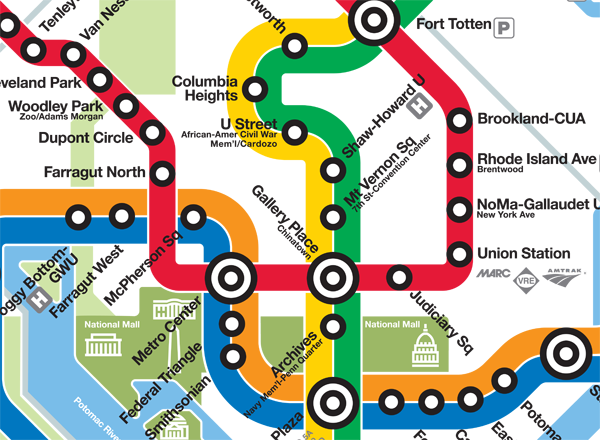Metro station names get a little more rational
WMATA decided to revise our iconic Metro map to include the Silver Line and account for slight changes in rush-hour service on the Orange and Blue Lines. The new design, pictured above, ameliorates one of the agency’s usability problems: name sprawl. The new map wisely rearranges several station names to move the less important parts of sprawling names onto smaller subtitles.
When the system was built, station names were originally designed to be short and represent geographic places. Due to politics, local boosterism, and unwise interference from local politicians, some names have exploded in length. The U Street station name, “U Street/African-American Civil War Memorial/Cardozo”, is often cited as the poster child of clunky name sprawl. It wasn’t supposed to be this way. U Street as a place has a history and regional recognition strong enough to stand on its own. The station was originally listed as “U Street”, but then “Cardozo” got tacked on. Worse yet, in 1999 the DC Council voted (and paid) to change the name from “U Street-Cardozo” to the ridiculously longwinded “U Street/African-Amer Civil War Memorial/Cardozo” in honor of the new memorial at the 10th Street entrance.
Since shortening a station name is fraught with political peril— imagine the accusations if you tried to remove “African-American Civil War Memorial” from U Street’s name— WMATA is simply rearranging long names to create primary names and subtitles. U Street isn’t the only station getting this much-needed reordering. Woodley Park (Zoo/Adams Morgan), Gallery Place (Chinatown), Mt. Vernon Square (7th St – Convention Center), and Archives (Navy Memorial – Penn Quarter) are among the other station names that will become less graphically imperious on the map.
Weekend Metro closure may bring unintended improvement

Temporarily closing a segment of the Green Line might ironically improve service for some this weekend. WMATA announced that it will close the Shaw, U Street, and Columbia Heights stations this weekend for scheduled track maintenance.
The stations will close at 10 pm Friday and won’t reopen until Tuesday morning’s normal opening time (Monday is a holiday). A similar closure will be in place on the Orange Line between East and West Falls Church stations as Metro works to connect the new Silver Line.
In the meantime, Metro will operate free shuttles along the route to ferry passengers through this service gap. Ironically, these shuttles may sometimes operate more frequently than the rail service would on a typical weekend.
Metro instituted a similar closure along a section of the Red Line on Labor Day weekend. On that weekend, we went to have brunch at a friend’s house in the Brookland neighborhood. During that time, Metro shuttles were running down his street every 2 minutes. Many of the buses were nearly empty, but for a moment we were jealous at the thought of transit service every 2 minutes.
Likewise, if WMATA keeps similarly short headways for the shuttles this weekend, the agency might actually enhance mobility between the Convention Center, Shaw, U Street, Columbia Heights, and Petworth.
One of Metro’s main shortcomings is that riding during non-rush periods, especially on weekends or at night, can entail waiting on platforms for as much as 24 minutes. This is an unacceptably low level of service, but our region lacks the political leadership to set a minimum level of transit service the way we do for utilities.
In DC, where 37% of households lack a car, the mayor and council chairman drive luxury cars at taxpayer expense, and other councilmembers receive free parking in front of the Wilson Building.
In the abstract, our leaders may appreciate the importance of frequent service, but nothing drives home the point like waiting on a Metro platform with 100 other people only to watch a packed train arrive half an hour later.
Though buses can’t match the speed and comfort of rail service, the frequency of bus shuttles this weekend might prove to be a significant, though temporary, transit improvement.








Recent Comments